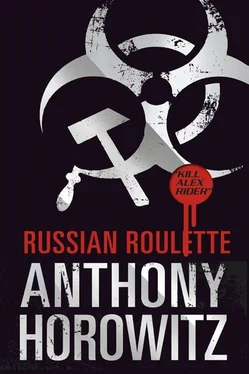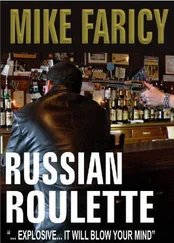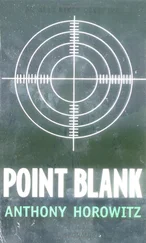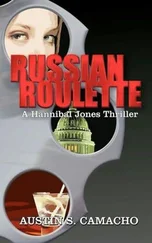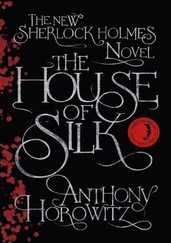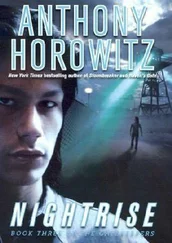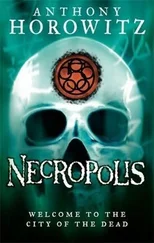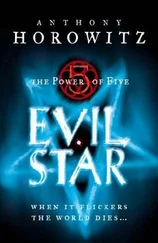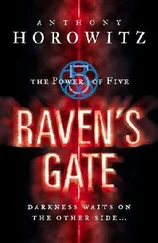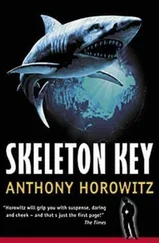Scorpia had looked into the situation and had decided that Sweetman was at his most vulnerable in the rainforest. It is interesting that they had a permanent team of advisers – strategy planners and specialists – who had prepared a consultation document for them. The house in Los Angeles was too close to its neighbours, the one in Miami too well protected. In Mexico City, Sweetman had too many friends. It was another measure of the man that he spent ten million dollars a year on bribes. He had friends in the police, the army and the government, and if anyone asked questions about him or tried to get too close, he would know about it at once.
In the jungle, he was alone and – like so many successful men – he had a weakness. He was punctual. He ate his breakfast at exactly seven-fifteen. He worked with a personal trainer from eight until nine. He went to bed at eleven. If he said he was going to leave at midday, then that would be when he would go. This is exactly what Hunter had tried to explain to me the night we met, in Venice. Sweetman had told us something about himself. He had a habit and we could use it against him.
Hunter and I had flown first from Rome to Lima and from there we had taken a smaller plane to Iquitos, an extraordinary city on the south bank of the Amazon with Spanish cathedrals, French villas, colourful markets and straw huts built on stilts, all tangled up together along the narrow streets. The whole place seemed to live and breathe for the river. It was hot and humid. You could taste the muddy water in the air.
We stayed two days in a run-down hotel in the downtown area, surrounded by backpackers and tourists and plagued by cockroaches and mosquitoes. Since so many of the travellers were from Britain and America, we communicated only in French. I spoke the language quite badly at this stage and the practice was good for me. Hunter used the time to buy a few more supplies and to book our passage down river on a cargo boat. We were pretending to be birdwatchers. We were supposed to camp on the edge of the jungle for two weeks and then return to Iquitos. That was our cover story and while I was on Malagosto I had learned the names of two hundred different species – from the white-fronted Amazon parrot to the scarlet macaw. I believe I could still identify them to this day. Not that anybody asked too many questions. The captain would have been happy to drop us anywhere – provided we were able to pay.
We did not camp. As soon as the boat had dropped us off on a small beach with a few Amazon Indian houses scattered in the distance and children playing in the sand, we set off into the undergrowth. We were both equipped with the five items which are the difference between life and death in the rainforest: a machete, a compass, mosquito nets, water purification tablets and waterproof shoes. The last item may sound unlikely but the massive rainfall and the dense humidity can rot your flesh in no time. Hunter had said it would take six days to reach the compound where Sweetman lived. In fact, we made it in five.
How do I begin to describe my journey through that vast, suffocating landscape… I do not know whether to call it a heaven or a hell. The world cannot live without its so-called green lungs and yet the environment was as hostile as it is possible to imagine with thousands of unseen dangers every step of the way. I could not gauge our progress. We were two tiny specks in an area that encompassed one billion acres, hacking our way through leaves and branches, always with fresh barriers in our path. All manner of different life forms surrounded us and the noise was endless: the screaming of birds, the croaking of frogs, the murmur of the river, the sudden snapping of branches as some large predator hurried past. We were lucky. We glimpsed a red and yellow coral snake… much deadlier than its red and black cousin. In the night, a jaguar came close and I heard its awful, throaty whisper. But all the things that could have killed us left us alone and neither of us became sick. That is something that has been true throughout my whole life. I am never ill. I sometimes wonder if it is a side-effect of the injection my mother gave me. It protected me from the anthrax. Perhaps it still protects me from everything else.
We did not speak to each other as we walked. It would have been a waste of energy and all our attention was focused on the way ahead. But even so, I felt a sort of kinship with Hunter. My life depended on him. He seemed to find the way almost instinctively. I also admired his fitness and stamina as well as his general knowledge of survival techniques. He knew exactly which roots and berries to eat, how to follow the birds and insects to waterholes or, failing that, how to extract water from vines. He never once lost his temper. The jungle can play with your mind. It is hot and oppressive. It always seems to stand in your way. The insects attack you, no matter how much cream you put on. You are dirty and tired. But Hunter remained good-natured throughout. I sensed that he was pleased with our progress and satisfied that I was able to keep up.
We only slept for five hours at night, using the moon to guide us after the sun had set. We slept in hammocks. It was safer to be above the ground. After we’d eaten our jungle rations – what we’d found or what we’d brought with us – we’d climb in and I always looked forward to the brief conversation, the moment of companionship, we would have before we slept.
On the fourth night we set up camp in an area which we called The Log. It was a circular clearing dominated by a fallen tree. When I had sat on it I had almost fallen right through, as it was completely rotten and crawling with termites. “You’ve done very well so far,” Hunter said. “It may not be so easy coming back.”
“Why’s that?”
“It’s possible we’ll be pursued. We may have to move more quickly.”
“The red pins…”
“That’s right.”
Whenever we came to a particular landmark, a place with a choice of more than one route, I had seen Hunter pressing a red pin close to the base of a tree trunk. He must have positioned more than a hundred of them. Nobody else would notice them but they would provide us with a series of pointers if we needed to move in a hurry.
“What will we do if he isn’t there?” I asked. “Sweetman may have left.”
“According to our intelligence, he’s not leaving until the end of the week. And never call him by his name, Cossack. It personalizes him. We need to think of him as an object… as dead meat. That’s all he is to us.” His voice floated out of the darkness. Overhead, a parrot began to screech. “Call him the Commander. That’s how he likes to see himself.”
“When will we be there?”
“Tomorrow afternoon. I want to get there before sunset… to give us time to reconnoitre the place. I need to find a position, to make the kill.”
“I could shoot him for you.”
“No, Cossack, thanks all the same time. This time you’re strictly here for the ride.”
We were up again at first light, the sky silver, the trees and undergrowth dark. We sipped some water and took energy tablets. We rolled up our hammocks, packed our rucksacks and left.
Sure enough, we reached the compound in the late afternoon. As we folded back the vegetation, we were suddenly aware of the sun glinting off a metal fence and crouched down, keeping out of sight. It was always possible that there would be guards patrolling outside the perimeter, although after half an hour we realized that the Commander had failed to take this elementary precaution. Presumably he felt he was safe enough inside.
Moving very carefully, we circled round, always staying in the cover of the jungle some distance from the fence. Hunter was afraid that there would be radar, tripwires and all sorts of other devices that we might activate if we got too close. Looking through the gaps in the trees, we could see that the fence was electrified and enclosed a collection of colonial buildings spread out over a pale green lawn. They were similar in style to the ones we had seen in Iquitos. There were a lot of guards in dark green uniforms, patrolling the area or standing with binoculars and assault rifles in rusting metal towers. Their long isolation had done them no good. They were shabby and listless. Hunter and I were both wearing jungle camouflage with our faces painted in streaks, but if we’d been in bright red they would not have noticed us.
Читать дальше
